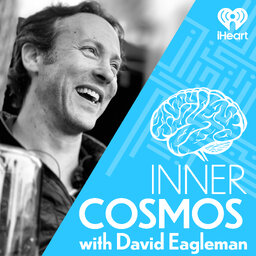Inner Cosmos Inbox 1
Eagleman answers listeners questions.
In 1 playlist(s)
Inner Cosmos with David Eagleman
Neuroscientist and author David Eagleman discusses how our brain interprets the world and what that …Social links
Follow podcast
Recent clips

Ep138 "Why do our political brains mistake opinion for truth?" with Kaizen Asiedu
1:07:52

Ep137 "Do cures ever create the next crisis?" with Thomas Goetz
47:09

Ep136 "Why do we care about mattering?" with Rebecca Goldstein
41:31
 Inner Cosmos with David Eagleman
Inner Cosmos with David Eagleman